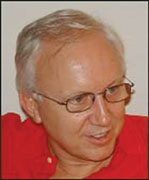|
observer |
|
|
|
|
|
OTHER LINKS |

|

|

|
Foreigners who came in search of a better future for children
During the last 11 years, the country has witnessed the arrival and departure of many great friends of the country. Mariana Todorova, a pugnacious woman with a consciousness, was head of the World Bank, who believed in the 3R Framework. She could not believe the state of Jaffna, which, in her mind, was 20 years behind the rest of the country, literally in darkness, in which, cars ran with vegetable oil, children studied by lamps and candle. Her successor, , leaves our shores after three plus years of committed service. One would find him sitting, very often, at Odel's on weekends, in more or less the same seating area, reportedly, one of the brightest amongst managers in the Bank. Brian Smith, a simple man, who would be as comfortable, walking along Duplication Road, as he was reporting the facts as he saw it, passionately, to his colleagues. His job was to ensure that the ADB programmes were conflict-sensitive. He was so honest, news of his departure genuinely moved many of his colleagues. A small-made man, looked upon as a brave friend of the country, Bernadino Ragazonni, the Swiss Ambassador, leaving for Indonesia. He was slim, chainsmoked and worked hard. He was slightly rounder, had stopped smoking, worked Sundays and was honest in conveying perspectives based on principles. He leaves us this week. He, probably, did the most for his country, than anyone before him, as he did for us. Jan Hueskan, at the Dutch mission, preceded some years back by Peter Kuiperus, who worked with a keen eye for local sentiments, genuinely believing the right of Sri Lankans to decide what was best for themselves. They all stood in unison, in supporting peace, last year, at the development forum in Kandy. In the world of the international community, some have a jolly good time. Reports of distress, leisurely life, endless meetings, lots of coffee and wine, not much more or serious work, as has been highlighted. If one was sitting in Delhi, they probably see a trade wind for India, opportunities for development through international. For those who are young today, it is a right to be freed of war. Recent attacks have put paid the chances for the symbols to recede. A recent analysis of why the LTTE has little faith in any realistic solutions says, "the CFA only froze the war." To transform, there has to be tangible gains put on the table, which gives a decent solution, with measures of devolved powers. The current political configuration does not lend itself to such a scenario. The cynic may well argue, the LTTE turned away a possible Ranil victory at the last Presidential poll, which would have given reasonable dividends in fair time. Others would say, they were never interested in resolving peacefully. The new British High Commissioner has, reportedly, requested all parties to take a leaf from South Africa and Northern Ireland, to walk to peace. Mandela was a warrior, who, through his enforced incarceration in Robin Island, survived to lead a new nation. His time away, may have tempered his instincts and given him a broader vision of nation building. Lee Kuan Yew, in a passage a of book released, remembers Ceylon as having a sterling reserve, two universities, educated talent in substantial numbers, but laments the effect of one man, one vote system, established majority domination, exit of English, quotas to universities and the advent of fanatical Tigers. He says, we failed because of weak or wrong leadership. For those living in the theatre of conflict, normalcy is not a luxury. We continue, to collectively, deny them that right. Denial of development, absence of normalcy, return of flight have a direct impact on civilians. This is the tale the Co- chairs were confronted with, when they met last in Tokyo. Trust and acts of good faith between the Government and the LTTE, hardly exist. It would seem that international actors need to play the role of peace keepers and peace builders, until, there is a sufficient tail wind to propel the country on a steady, unwavering journey to peace. In private moments, all sides seek an honourable end to conflict and war. We need civic leadership which responds to this national need. |







